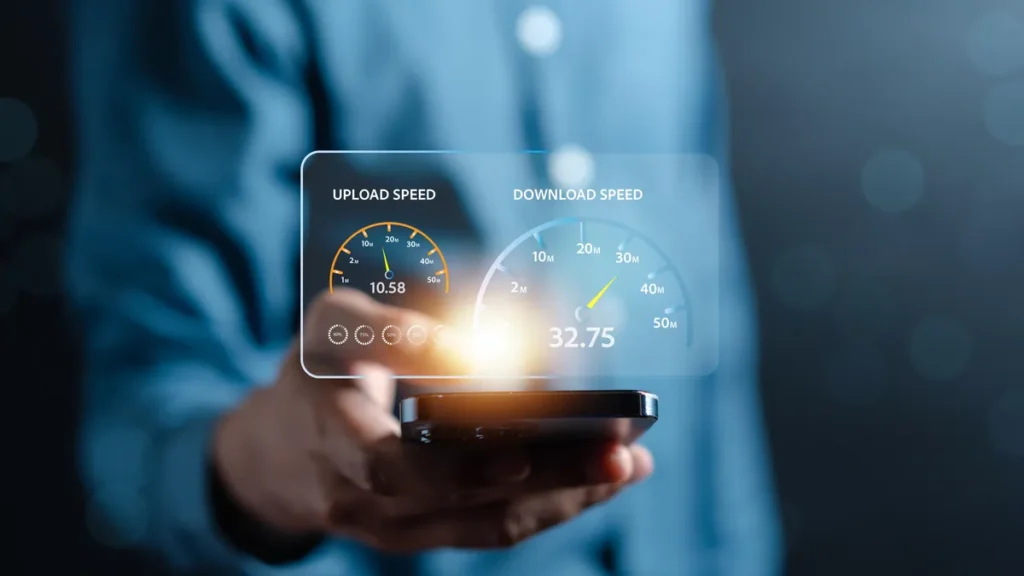In today’s always-connected world, data speed is everything. Whether you’re streaming your favorite TV shows in 4K, gaming online, or making sure your home security system is always on guard, a fast internet connection makes all the difference.
But have you ever wondered what actually controls how fast your internet feels? Let’s break down the factors that affect data transmission speed so you know exactly what’s going on behind the scenes – and how to get the best performance possible.
The Basics: What Is Data Transmission?
At its core, data transmission is simply the process of sending information from one device to another – across your home network, your internet provider, and beyond. The faster that data moves, the smoother your streaming, downloads, video calls, and other online activities will be.
How the Type of Connection Impacts Data Speed
Your internet speed depends heavily on the medium carrying your data:
- Wired connections (Ethernet) – Reliable and stable. Great for fast internet speeds without interference.
- Wireless connections (Wi-Fi) – Convenient, but can slow down if there’s interference from walls, other devices, or crowded airwaves.
- Fiber-optic internet – The gold standard for ultra-fast speeds, sending data at the speed of light with minimal loss.
If you’re after maximum streaming performance or need rock-solid speeds for work or gaming, a wired or fiber connection will almost always beat Wi-Fi.
Bandwidth: Your Internet Highway Size
Think of bandwidth like a highway. The wider it is, the more “cars” (data) can travel at once. A narrow “road” will cause congestion, even if your connection is technically capable of fast internet.
If you’ve got multiple devices streaming movies, gaming, or downloading at the same time, higher bandwidth will keep things running smoothly.
Latency: The Hidden Delay
Latency is the time it takes for data to make a round trip between you and whatever you’re connecting to – whether it’s a streaming server or a video call partner.
- Low latency = smooth, instant responses.
- High latency = lag, buffering, and frustration.
Latency is influenced by distance (how far the data travels) and the number of “stops” along the way (routers, switches, servers).
The Role of Network Infrastructure
Your home network hardware – like your router and modem – is just as important as your ISP’s technology. A modern, well-maintained router can handle higher speeds, reduce bottlenecks, and give you the fast internet your plan promises. Outdated equipment can slow everything down, even if you’re paying for high-speed service.
External Factors That Can Slow You Down
Even with great infrastructure, some factors are out of your control:
- Network congestion during peak hours.
- Distance from the server hosting the website or stream.
- Interference for wireless signals from other electronics, walls, or even your neighbor’s Wi-Fi.
The Future of Data Speed
The good news? Internet speeds keep getting faster. With 5G networks rolling out and fiber-optic coverage expanding, expect smoother streaming, more reliable video calls, and even better smart home performance.
Conclusion
Data speed isn’t just about your internet plan – it’s shaped by your connection type, bandwidth, latency, network equipment, and even time of day. Understanding these factors can help you troubleshoot slow connections and make smart choices for fast internet that keeps up with your streaming, work, and everyday online life.
Call SmarterHome.ai today and we can help you upgrade your current plan or compare providers to find even better deals for your lifestyle and budget.
FAQs
- What’s the biggest factor in internet speed? It’s a mix of your connection type, bandwidth, and latency – but outdated equipment can also slow things down.
- Does fiber internet really make a difference for streaming? Absolutely. Fiber offers faster speeds and lower latency, which means smoother streaming and less buffering.
- How can I improve my data speed at home? Upgrade your router, use wired connections where possible, and make sure your plan has enough bandwidth for your household’s needs.
- Will internet speeds keep getting faster? Yes – with 5G and next-gen fiber networks, we’re heading toward even better streaming quality, faster downloads, and more reliable connections.


